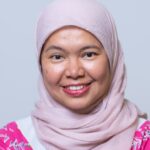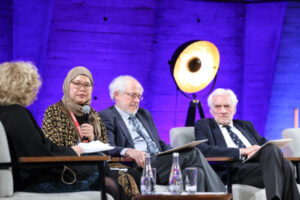On 8-9 November 2024, the annual Aceh International Workshop and Expo on Sustainable Disaster Recovery (AIWEST) took place in Indonesia. IDOS researcher Irina Rafliana, a Tsunami expert, co-organised a special session.

A couple of years after the Indian Ocean tsunami on 26 December 2004, one of the local universities in Banda Aceh, the city most affected by the event, initiated a Tsunami Disaster and Mitigation Research Center (TDMRC). The center conducts the annual Aceh International Workshop and Expo on Sustainable Disaster Recovery, or AIWEST, since 2006. The hosting of the international workshop took place also in Tohoku University, Sendai, Japan (2011), in Sydney, Australia, in 2022, and in Jogjakarta, Indonesia (2023). This year the workshop returned to its home in Banda Aceh, and was organised on the 8-9 November 2024 by Syiahkuala University.
The workshop also hosts special sessions. Irina Rafliana, PhDC, and (IDOS/BRIN), together with sociologist and human geographer Prof. Nigel Clark (Lancaster University) and Rina Suryani Oktari, PhD (TDMRC Syiahkuala University) jointly organised a special session titled ‘Thinking with Tsunamis and Living in a Hyperactive Planet. The session interactively engaged with the 2004 tsunami survivor and village activist in Pulo Aceh (Muhammad Ulpa), tsunami survivor, literacy activist and artist from Palu, Central Sulawesi (Rahmadiyah Tria Gayathri, from Forum Sudut Pandang), anthropologist (Dr. Hery Jogaswara, BRIN), and a tsunami modeler/tsunami warning centre Indonesia (Wza, Ph.D). Prof. Clark was also invited as one of the keynote speaker at the international workshop.
The special session – organised bilingually and in hybrid mode – addressed several reflective questions:
- How have social sciences engaged with earthquakes and tsunamis in the past 20 years?
- What lessons have been learned and unlearned, and what had social science missed or failed to address?
- What challenges continue to lay ahead as humans extend the complexities of living on this volatile earth?
- What philosophical questions were missed, and what are the consequences of such absence?
IDOS Colleague at Global Tsunami Symposium, Banda Aceh Indonesia
BMKG Indonesia, IOC UNESCO and the global Joint Tsunami Commission organized the 2nd Global Tsunami Symposium in Banda Aceh on 11-14 November 2024. Irina Rafliana, IDOS, presented research from her doctoral thesis in the Social Science session.

The symposium is one of the largest conventions of tsunami science that brings together scientists, engineers, practitioners and policy makers from all over the globe and addresses the state of the art of tsunami science. The first symposium was held in Japan 2011, after the Great East Japan tsunami. For the second symposium, and coinciding with 20 years of Indian Ocean tsunami, one of IDOS’ researchers, Irina Rafliana, was invited as one of the panelists on the Social Science session.
Irina Rafliana presented a topic related to her doctoral thesis, which corresponds and, at the same time, challenges the current debate on the role of knowledge, science and tsunami warning systems through the lens of sociological and science and technology studies. Her presentation was entitled: Tsunami Science: A Social Perspective?
The symposium was attended by at least 54 countries and more than 500 participants, marking the importance of remembrance and knowledge advancement in the tsunami domain.
Solemn Commemoration of the Indian Ocean Tsunami
The UNESCO Headquarters in Paris, France, had organised the 20th Anniversary of the Indian Ocean Tsunami, on 26 November, one month before the 20-year commemoration. IDOS researcher Irina Rafliana was invited as a panellist to this event.

The event took place in the premises of UNESCO and was open to the public. Around 300 participants signed up for the event marked how the event remained in the global memory as among the most important events in human history. The Commemoration took place at the UNESCO headquarters, honouring the tragic loss and also the resilience of survivors while at the same time underpinning the significant progress in tsunami science throughout the world.
The event was opened by the representative of UNESCO Director-General, with attendance of high-level officials from the affected countries. The event also curated survival stories and personal journey of survivals from the Indian Ocean (2004) and Palu (2018) events. The event was concluded by a special performance from a renowned violinist Eijn Nimura.

IDOS researcher Irina Rafliana was once again invited to this esteemed event right after she finished her PhD defence at IDOS. She joined the panel together with two senior researchers: Dr. François Schindele (tsunami scientists from France) and Dr. Peter Koltermann (a leading German oceanographer and Head of the Tsunami Coordination Unit of UNESCO 2006-2011). Irina Rafliana shared her thoughts on the contemporary gaps and challenges in tsunami risk communication and also the social dimensions of tsunami warning systems, learning from real events in the past two decades. While highlighting the progress made in tsunami science, working with tsunami risks is like aiming at a moving target, where risk perceptions continuously change as human mobility increases, and at the same time, the geological dynamics offer high uncertainties. It would therefore be important to address the challenges of such complex and cascading risks, superimpose by human-made disasters and to redefine what resilience could mean for many coastal dwellers in the future.

Schreibe einen Kommentar